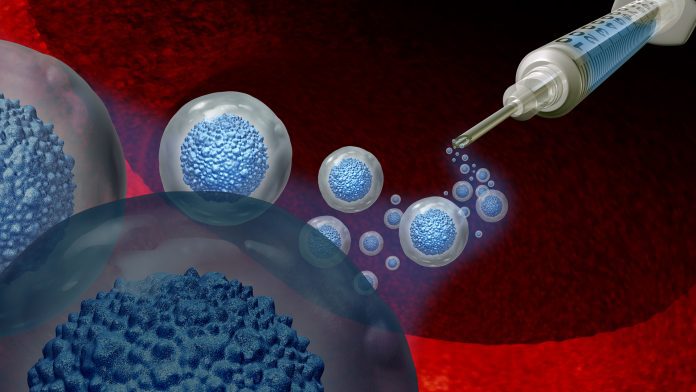
In a groundbreaking clinical trial, a patient living with HIV has been seemingly cured after receiving a blood stem cell transplant.
The individual initially received the blood stem cell transplant for high-risk acute myeloid leukaemia but has now been free of HIV for 14 months after stopping their antiretroviral drug treatment, signifying the transplant may be a cure for the disease. The transplant was performed by scientists at Weill Cornell Medicine, and similarly to two other successful reported cases, the transplanted donor cells contained a mutation that makes them resistant to HIV infection.
The Weill Cornell Medicine trial received funding from the NIH and included collaboration from researchers at the University of California Los Angeles, Johns Hopkins University School of Medicine and several other institutions.
Performing the stem cell transplant
The team implemented transplants of blood- and immune-cell replenishing stem cells to the patient after her own blood cell population, including leukemic cells, was decimated by high-dose chemotherapy.
The cells for the treatment were procured from two sources: stem cells from a healthy adult relative were utilised to restore her blood cell population to mitigate infectious complications rapidly, and umbilical cord blood from an unrelated newborn child was employed to achieve long-term blood reconstitution.
Cord blood is used to supply blood stem cells for transplants for people who cannot find a matched adult donor. Experts suggest that cord blood may be successfully used even when they come from an unrelated donor whose immune markers only partially match the recipient.
For their investigation, the team administered cord blood that contained an HIV-resistant variant known as CCR5Δ32; HIV usually commandeers the CCR5 co-receptor to infect immune cells. However, the receptor’s Δ32 variant can effectively block viral entry.
Curing HIV
Three months following the stem cell transplant, test results demonstrated that the individual’s blood population was derived entirely from the HIV-resistant cord blood cells, with post-transplant studies signifying that HIV could no longer be detected by numerous sensitive assays.
Subsequently, the patients stopped taking antiviral drugs to suppress the disease and are currently free of HIV drugs for 14 months. There have been no signs of reinfection from HIV after close follow-up during the COVID-19 pandemic, suggesting that the stem cell transplant is a likely cure, although the physicians are currently labelling this stage as long-term remission. The patient has also been free of leukaemia for over four years.
Moreover, there have been two previous cases of long-term HIV remission in two cancer patients who received an adult CCR5Δ32 stem cell transplant. However, this is the first case to use cord blood cells and treat a woman and someone who identifies as mixed-race. Due to the CCR5Δ32 variant being more prevalent among European heritage, it is challenging to source well-matched donors for a traditional stem cell transplant into non-white patients, although cord blood use partly alleviates this issue.
The team concluded that cord blood containing the CCR5Δ32 variant potentially provides a cure for haematological malignancies and HIV and should be implemented as a stem cell source when HIV-positive cancer patients require a blood stem cell transplant. Contrastingly, the procedure is believed to be too risky for HIV-positive patients who do not need such transplants.






















